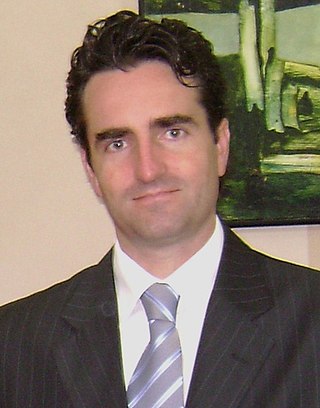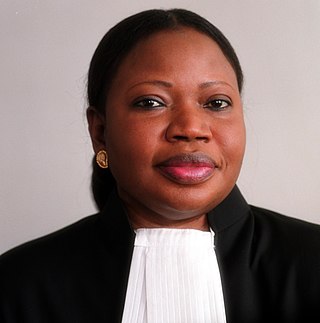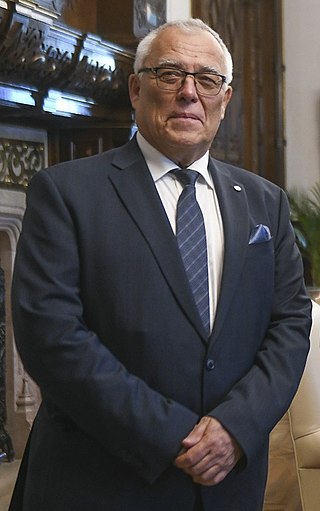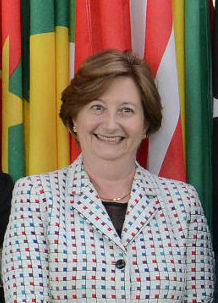
The International Criminal Court is an intergovernmental organization and international tribunal seated in The Hague, Netherlands. It is the first and only permanent international court with jurisdiction to prosecute individuals for the international crimes of genocide, crimes against humanity, war crimes and the crime of aggression. It is distinct from the International Court of Justice, an organ of the United Nations that hears disputes between states.

The politics of Uruguay abide by a presidential representative democratic republic, under which the President of Uruguay is both the head of state and the head of government, as well as a multiform party system. The president exercises executive power and legislative power and is vested in the two chambers of the General Assembly of Uruguay. The Judiciary is independent from the executive and legislature.

The Rome Statute of the International Criminal Court is the treaty that established the International Criminal Court (ICC). It was adopted at a diplomatic conference in Rome, Italy on 17 July 1998 and it entered into force on 1 July 2002. As of November 2019, 123 states are party to the statute. Among other things, it establishes court function, jurisdiction and structure.

Elizabeth Odio Benito is a lawyer and politician from Costa Rica. She served as President in the Inter-American Court of Human Rights from 2018 to 2020. She was a Vice-President of the International Criminal Court. She previously served as a judge on the International Criminal Tribunal for the Former Yugoslavia, and in her home country of Costa Rica was twice appointed Justice Minister, later becoming Vice-President of the Republic. Her background is as an academic lawyer, specialising in the administration of justice and human rights, in particular the rights of women.

The states parties to the Rome Statute of the International Criminal Court are those sovereign states that have ratified, or have otherwise become party to, the Rome Statute of the International Criminal Court. The Rome Statute is the treaty that established the International Criminal Court, an international court that has jurisdiction over certain international crimes, including genocide, crimes against humanity, and war crimes that are committed by nationals of states parties or within the territory of states parties. States parties are legally obligated to co-operate with the Court when it requires, such as in arresting and transferring indicted persons or providing access to evidence and witnesses. States parties are entitled to participate and vote in proceedings of the Assembly of States Parties, which is the Court's governing body. Such proceedings include the election of such officials as judges and the Prosecutor, the approval of the Court's budget, and the adoption of amendments to the Rome Statute.

The eighteen judges of the International Criminal Court (ICC) are elected for nine-year terms by the member-countries of the court. Candidates must be nationals of those countries and they must "possess the qualifications required in their respective States for appointment to the highest judicial offices".

Marc Perrin de Brichambaut is a French career judge and diplomat. On 10 December 2014 he was elected a judge to the International Criminal Court (ICC) in The Hague. Until 30 June 2011 he was the Secretary General of the Organization for Security and Co-operation in Europe.

Bruno Stagno Ugarte was the Minister of Foreign Affairs of Costa Rica from 2006 to 2010 and was the president of the Assembly of States Parties of the International Criminal Court (ICC) from 2005 to 2008.

Christian Wenaweser is a Liechtenstein diplomat.

Fatou Bom Bensouda is a Gambian lawyer and former Prosecutor of the International Criminal Court (ICC), who has served as the Gambian High Commissioner to the United Kingdom since 3 August 2022.
Anita Ušacka is a Latvian and international judge and legal academic. She has been a judge of the Constitutional Court of the Republic of Latvia and of the Trial and Appeals Divisions of the International Criminal Court (ICC). She was President of the Appeals Division of the International Criminal Court in 2011/2012. She retired in 2015.

Sanji Mmasenono Monageng has been a judge of the International Criminal Court (ICC) since 2009.

The Presidency of the International Criminal Court is the organ responsible for the proper administration of the Court.
Six judges of the International Criminal Court were elected during the 10th session of the Assembly of States Parties to the Rome Statute of the International Criminal Court in New York between 12 and 21 December 2011. The judges elected, Anthony Carmona of Trinidad and Tobago, Miriam Defensor Santiago of the Philippines, Chile Eboe-Osuji of Nigeria, Robert Fremr of the Czech Republic, Olga Venecia Herrera Carbuccia of the Dominican Republic and Howard Morrison of the United Kingdom, took office on 11 March 2012.

The prosecutor of the International Criminal Court is the officer of the International Criminal Court whose duties include the investigation and prosecution of the crimes under the jurisdiction of the International Criminal Court, namely genocide, crimes against humanity and war crimes as well as the crime of aggression.

Silvia Alejandra Fernández de Gurmendi is an Argentine lawyer, diplomat and judge. She has been a judge at the International Criminal Court (ICC) since 20 January 2010 and was the first woman President of the ICC from March 2015 to March 2018. She was elected to the presidency for a three-year term and served until March 2018. In 2020 she was elected to serve as President of the Assembly of States Parties to Rome Statute of the International Criminal Court for the twentieth to twenty-second sessions (2021-2023).
A special election for three judges of the International Criminal Court was held during the 6th session of the Assembly of States Parties to the Rome Statute of the International Criminal Court in New York on 30 November and 3 December 2007.
An ordinary election for six judges of the International Criminal Court was held during the resumption of the 4th session of the Assembly of States Parties to the Rome Statute of the International Criminal Court in New York on 26 January 2006.

Anthony Thomas Aquinas Carmona is a Trinidadian politician who was the fifth President of Trinidad and Tobago from 2013 to 2018. Previously, he was a High Court Judge at the Supreme Court of Trinidad and Tobago, and he served as a Judge of the International Criminal Court from 2012 to 2013.
Six judges of the International Criminal Court were elected during the 13th session of the Assembly of States Parties to the Rome Statute of the International Criminal Court scheduled for 8 to 17 December 2014 in New York. The judges were elected for terms of nine years and took office on 11 March 2015.













